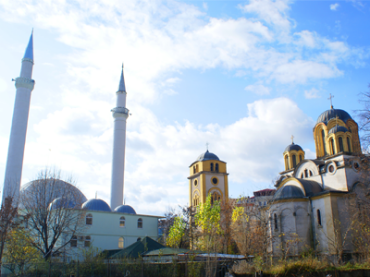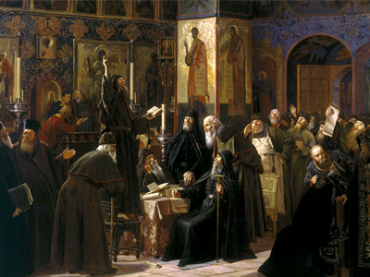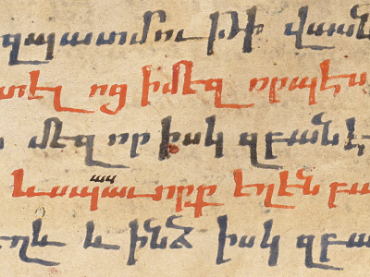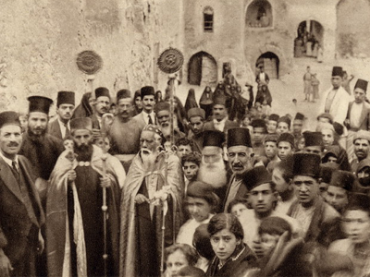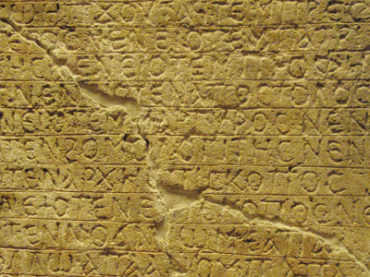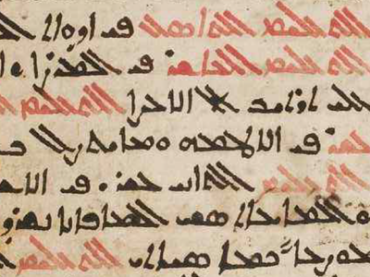Syriac and Eastern Christianity
The Chronicle of Michael the Great (The Edessa-Aleppo Syriac Codex)
Books XV–XXI. From the Year 1050 to 1195 AD
Edited and Translated by Amir Harrak
Series: Gorgias Chronicles of Late Antiquity 3
ISBN: 978-1-4632-4031-8
Michael the Great was elected patriarch of the Syriac Orthodox church in a most instable period. He nevertheless, found time, clarity of mind, and determination to write a voluminous world chronicle, which he completed four years before he died in November 7, 1199. The present edition and its translation begin with Book XV and end with Book XXI, the last Book in the Chronicle, thereby covering more than 160 years, from AD 1031 to AD 1195.
$215.00
Studies in Biblical Philology and Lexicography
Edited by Daniel King
ISBN: 978-1-4632-4035-6
This volume offers papers that emerged from the meeting of the International Syriac Language Project (ISLP) which took place at Stellenbosch University, South Africa, in September 2016, and at the Humboldt-Universität zu Berlin, in August 2017. The ISLP invites research not only into Syriac, but extends its range to all ancient language lexicography. Hence its proceedings enrich the whole field of Syriac, Hebrew, and Greek lexicography. The ISLP especially encourages research into the interfaces between these languages, and hence the current volume contains a number of papers on translation equivalence: Hebrew-Greek, Hebrew-Syriac, and Greek-Syriac. Other philologically focused pieces explore matters relating to textual and manuscript traditions. All of these are preceded in the present volume by an extensive review of the production and achievements of the ISLP to date.
$149.00
The Syriac Orthodox in North America (1895–1995)
A Short History
Series: Gorgias Handbooks 42
ISBN: 978-1-4632-4037-0
A short history of the Syriac Orthodox community in North America between 1895, the year of the First Sayfo that triggered the first wave of immigration to North America, and 1995, marking the passing away of Metropolitan Mor Athanasius Yeshue Samuel, the first and only Archbishop of the Syriac Orthodox Archdiocese of the United States and Canada.
$42.00
Middle Eastern Christians Facing Challenges
Reflections on the Special Synod for the Middle East
Edited by Dietmar W. Winkler
ISBN: 978-1-4632-4041-7
This volume has arisen from the 'Middle East Synod' in Rome in 2010. The articles within focus on the relations of Christians and Churches with their socio-political, religious and ecclesial environments. Ecumenical relations and communion are at stake as well as relationships, witness and dialogue with Jews, Muslims, state entities, and new relations forged in the West through emigration and diaspora.
$114.95
The Mystical Tradition of the Eastern Church
Studies in Patristics, Liturgy, and Practice
Edited by Sergey Trostyanskiy & Jess Gilbert
Series: Gorgias Eastern Christian Studies 56
ISBN: 978-1-4632-4060-8
This volume presents the work of contemporary Orthodox thinkers who attempt to integrate the theological and the mystical. Exciting and provocative chapters treat a wide variety of mysticism, including early Church accounts, patristics (including the seemingly ever-popular subject of deification), liturgy, iconography, spiritual practice, and contemporary efforts to find mystical sense in cyber-technologies and post-humanism.
$114.95
On This Day (May)
The Armenian Church Synaxarion (Yaysmawurkʿ)
Edited and Translated by Edward G Mathews Jr
Series: The Armenian Church Synaxarion 5
ISBN: 978-1-4632-4064-6
The Armenian Church Synaxarion is a collection of saints’ lives according to the day of the year on which each saint is celebrated. Part of the great and varied Armenian liturgical tradition from the turn of the first millennium, the first Armenian Church Synaxarion represented the logical culmination of a long and steady development of what is today called the cult of the saints. This volume, the first Armenian-English edition, is the fifth of a twelve-volume series—one for each month of the year—and is ideal for personal devotional use or as a valuable resource for anyone interested in saints.
$98.00
The Syriac Tradition of the Infancy Gospel of Thomas (paperback)
A Critical Edition and English Translation
By Tony Burke
Series: Gorgias Eastern Christian Studies 48
ISBN: 978-1-4632-4091-2
A long-awaited and essential tool for the study of one of the earliest texts of the Christian Apocrypha and an important text in Syriac literature, theology, and history.
$89.00
Hugoye - Journal of Syriac Studies (volume 21)
2018
General Editor George Anton Kiraz
Series: Hugoye: Journal of Syriac Studies 21
ISBN: 978-1-4632-4093-6
Widely regarded as a premier journal dedicated to the study of Syriac, Hugoye: Journal of Syriac Studies was established in 1998 as a venue devoted exclusively to the discipline. An organ of Beth Mardutho, the Syriac Institute, the journal appears semi-annually and will be printed in annual editions. A peer-reviewed journal, Hugoye is a respected academic source for up-to-date information about the state of Syriac studies and for discovering what is going on in the field. Contributors include some of the most respected names in the world of Syriac today.
$75.00
The Syriac Dot (paperback)
A Short History
ISBN: 978-1-4632-4100-1
The dot is used for everything in Syriac from tense to gender, number, and pronunciation, and unsurprisingly represents one of the biggest obstacles to learning the language. Using inscriptions, early grammars, and experiments with modern scribes, Dr. Kiraz peels back the evolution of the dot layer by layer to explain each of its uses in detail and to show how it adopted the wide range of uses it has today.
$52.00
Journal of the Canadian Society for Syriac Studies 19
ISBN: 978-1-4632-4111-7
A refereed journal published annually by the Canadian Society for Syriac Studies.
$75.00
History of Eastern Christianity (paperback)
Series: Gorgias Eastern Christian Studies 16
ISBN: 978-1-4632-4115-5
This book is a classic in the history of the Oriental Churches, which are sometimes portrayed as heretical in general church history books, if mentioned at all. Written by a Copt, it portrays the history of the faith of these non-Chalcedonian Churches with first-hand knowledge of their traditions. The author covers Alexandrine Christianity (the Copts and the Ethiopians), the Church of Antioch (Syriac Orthodox), the “Nestorian” Church of the East, the Armenian Church, the St. Thomas Christians of South India, the Maronite Church, as well as the Vanished Churches of Carthage, Pentapolis, and Nubia.
$110.00
Jacob of Sarug’s Homilies on the Six Days of Creation (The Fifth Day)
The Fifth Day
Edited and Translated by Edward G Mathews Jr
Series: Texts from Christian Late Antiquity 55
ISBN: 978-1-4632-4117-9
In this fifth installment of the long Homily 71, On the Six Days of Creation, Jacob treats of the events of the fifth day, the creation from the waters of the various species of fish and reptiles, as well as the assorted types of birds and other winged creatures. God created them all in wisdom and in love, prepared everything that they would need and endowed them with the natural characteristics required for their particular type of life. Jacob highlights the fact that the creation of these animals on the fifth day to inhabit the land and water separated on the third day is a symbol of the Resurrection of Christ.
$38.50
The Law Code of Simeon, Bishop of Rev-Ardashir
Edited and Translated by Amir Harrak
Series: Texts from Christian Late Antiquity 57
ISBN: 978-1-4632-4134-6
The Law Code of Simeon of Rev-Ardashir, originally written in Persian, was translated into Syriac by a monk of Bēṭ-Qatrāyē. The Code's author, possibly to be identified with a rebellious metropolitan mentioned in the letters of Patriarch Īšoʿ-yahb III, aims to clarify theoretical scriptural law, and to address specific cases of inheritance law.
$48.40
On This Day (June)
The Armenian Church Synaxarion (Yaysmawurkʿ)
Edited and Translated by Edward G Mathews Jr
Series: The Armenian Church Synaxarion 6
ISBN: 978-1-4632-4137-7
The Armenian Church Synaxarion is a collection of saints’ lives according to the day of the year on which each saint is celebrated. Part of the great and varied Armenian liturgical tradition from the turn of the first millennium, the first Armenian Church Synaxarion represented the logical culmination of a long and steady development of what is today called the cult of the saints. This volume, the first Armenian-English edition, is the sixth of a twelve-volume series—one for each month of the year—and is ideal for personal devotional use or as a valuable resource for anyone interested in saints.
$102.00
Beth Qaṭraye
A Lexical and Toponymical Survey
By Dr Mario Kozah, George Anton Kiraz, Prof Abdulrahim Abu-Husayn, Haya Al Thani & Saif Shaheen Al-Murikhi
Series: Gorgias Eastern Christian Studies 58
ISBN: 978-1-4632-4139-1
This volume presents and analyzes information on the pre-Islamic and early Islamic historical geography and toponyms of the Beth Qaṭraye region as well as newly discovered vocabulary from a language referred to as Qaṭrāyīth (“in Qatari”) used by its inhabitants.
$55.00
English - Neo-Aramaic Dictionary
Dialects of the Jews of Zakho, Nerwa, Amidya and Dehok (North-West Kurdistan)
By Yona Sabar
Series: Gorgias Handbooks 45
ISBN: 978-1-4632-4144-5
Based on Sabar's 2002 Jewish Neo-Aramaic dictionary, this dictionary serves a functional purpose for readers and scholars who would like to know the Neo-Aramaic vocabulary. It does not include grammatical or semantic details but does include the origin of the words, be it native Old Aramaic, and, in the case of loanwords, the original lending language, Arabic, Kurdish, Persian, Turkish, etc.
$55.50
Meccan Trade and the Rise of Islam (paperback)
Series: Gorgias Islamic Studies 6
ISBN: 978-1-4632-4172-8
The late Patricia Crone reassesses one of the most widely accepted dogmas in contemporary accounts of the beginnings of Islam: the supposition that Mecca was a trading center. In addition, she seeks to elucidate sources on which we should reconstruct our picture of the birth of the new religion in Arabia.
$74.00
Gorgias Illustrated Learner's Syriac-English, English-Syriac Dictionary
Series: Gorgias Handbooks 46
ISBN: 978-1-4632-4180-3
The Gorgias Illustrated Learner's Syriac English, English-Syriac Dictionary is both a convenient academic resource and a door into the world of Modern Literary Syriac. With 13,000 entries drawn from the major existing works, alongside dozens of explanatory boxes on biblical, historical, theological, liturgical, cultural, as well as grammatical topics, and over 80 colored illustrations, it is a practical tool for those that wish to access all but the most specialized Classical Syriac texts.
$48.00
A History of the Study of Grammar among the Syrians
An English translation of Historia artis grammaticae apud Syros
By Adalbert Merx; Translated by Daniel King
ISBN: 978-1-4632-4197-1
An English translation of a Latin work on the Syriac grammatical tradition ('Historia artis grammaticae apud Syros') by the 19th-century German theologian and linguist, Adalbert Merx.
$95.00 $76.00
Jacob of Sarug’s Homilies on the Six Days of Creation (The Sixth Day)
The Sixth Day
Edited and Translated by Edward G Mathews Jr
Series: Texts from Christian Late Antiquity 59
ISBN: 978-1-4632-4211-4
In this sixth installment of the long Homily 71, On the Six Days of Creation, Jacob treats the events of the sixth day.
$38.50
Moshe Bar Kepha's Commentary on the Gospel of Luke
Edited and Translated by Abdul-Massih Saadi
Series: Gorgias Eastern Christian Studies 59
ISBN: 978-1-4632-4221-3
Moshe Bar Kepha was a prolific writer of the ninth century. His writings reflect various aspects of West Syriac theology and ecclesiology, and his literary legacy links the earlier Syriac exegetical tradition (beginning with Ephrem) with the Syriac 'Renaissance' of the eleventh to thirteenth centuries. His use of sources crosses Christian confessional boundaries in such a way that his works are tinged with aspects of Syriac exegesis from both East and West Syriac traditions. In his Commentary on Luke, the Muslim-dominated context in which Moshe lived is clearly evident in the background, and his aim is to fortify the credibility of the Christian faith and the validity of Christian doctrines for his readers.
$156.00
John of Dara On the Resurrection of Human Bodies
Edited and Translated by Aho Shemunkasho
Series: Bibliotheca Nisibinensis 4
ISBN: 978-1-4632-4225-1
An edition and translation of the four treatises of John of Dara (d. 860) On the Resurrection of Human Bodies.
$165.00
Justinian's Indecision
How Social Networks Shaped Imperial Policy
ISBN: 978-1-4632-4227-5
Since the time of Eduard Schwartz, scholars have tended to treat ecclesiastical policy under the influence of Justinian as inconsistent and even capricious. This book argues that such an image of Justinian, although seeming to provide a coherent narrative concerning the emperor’s character, falls apart when the details are scrutinized.
$120.00
The Bible in the Syriac Tradition (Third Edition)
Series: Gorgias Handbooks 52
ISBN: 978-1-4632-4233-6
This is a basic introduction to the various Syriac translations of the Bible and the ways in which they were used in the Syriac tradition. After an initial discussion of the general problems of biblical translation, the different surviving Syriac translations are outlined, as well as biblical manuscripts, lectionaires, printed editions, and translations. A reception history of the Syriac Bible covers the ways in which it has been interpreted, the commentary tradition, its use in preaching, in liturgy, and in spirituality. An appendix offers some comparative samples (in translation) to illustrate some of the differences between the different Syriac translations.
$53.00
Gregory Barhebraeus' Mystical Hermeneutics of the Love of God in Dialogue with Islamic Tradition
Series: Islamic History and Thought 23
ISBN: 978-1-4632-4247-3
An inquiry into the mystical thought of Gregory Barhebraeus, offering a reading of Barhebraeus’ mystical texts by bringing them into conversation with critical religious studies and the hermeneutical tradition of philosophy.
$133.00
Filter by
Filter by price
Filter by manufacturer

